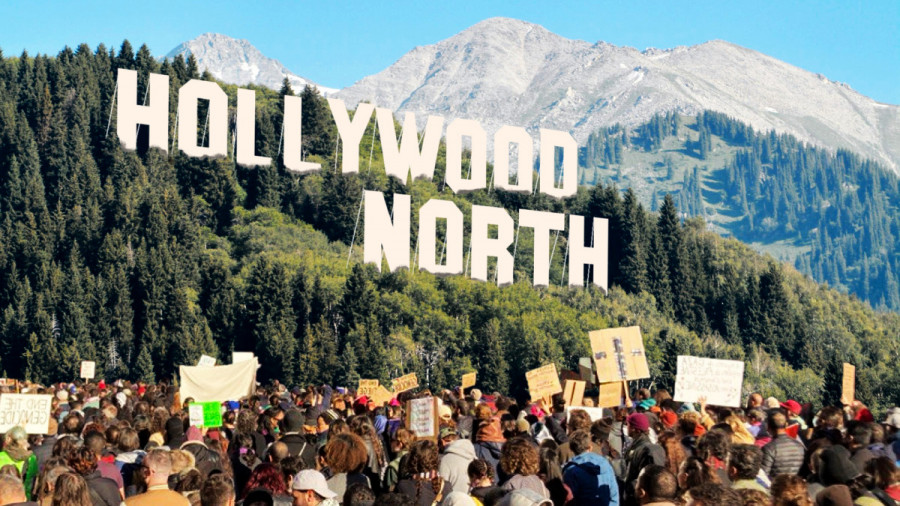A closer look into Canada’s “Hollywood North” Industry
How the Hollywood strike impacted Canadian studios
Over the years, Canada gained the savvy nickname “Hollywood North” as the United States’ alternative destination for television and film production. The various scenic landscapes and 20 per cent tax credits in the province of Quebec attracted large studio companies to its doorstep.
According to a recent report from the Canadian Media Producers Association, in 2022, Canadian productions of television and film rose by 28 per cent, reaching an all-time high of $11.6 billion CAD, but the record was yet to be overshadowed by Hollywood’s imminent strike, which lasted nearly half a year.
Concerns over wage increases, better residuals and protection over artificial intelligence were at the forefront of negotiations between the Writers Guild of America (WGA) and the Alliance of Motion Picture and Television Producers (AMPTP), which represents major studios such as Paramount, Warner Bros., Discovery, Amazon and Netflix.
On May 2, 2023, the WGA revealed in a press release that they were calling for a strike following six weeks of failed negotiations with the AMPTP. This failed negotiation led to the second-longest strike the WGA ever performed, picketing for nearly 150 days.
Almost two months after the WGA’s announcement, the Screen Actors Guild-American Federation of Television and Radio Artists (SAG-AFTRA) joined Hollywood’s writers in protest, completely shutting down production in the world’s largest television and film industry.
It was the second time in nearly 65 years that both writers and actors came together in unanimity.
“Until the studios make a deal that addresses the needs of performers, WGA members will be on the picket lines, walking side-by-side with SAG-AFTRA in solidarity,” said WGAE President Lisa Takeuchi in a press release on Oct. 9, 2023, after the WGA had ratified their agreement.
The standstill on production remained in place until Nov. 9, when the actors’ guild finally reached an agreement.
Economic experts from the Milken Institute reported that a total economic loss of at least $5 billion USD was expected for production hubs in California, New Mexico, Georgia and New York. In Canada, the economic impact of the strike was mostly felt in service productions, which refer to films and television series that do not have Canadian stars, writers or directors but that are nonetheless filmed here in Canada.
Michael Prupas, the founder and executive chairman of Muse Entertainment, whose company has offices in Montreal, Toronto and Vancouver, said that the revenue generated from service productions declined from about $250 million CAD in 2022 to only $50 million CAD in 2023.
“The Hollywood strike had a significant impact on these service productions,” said Prupas. “On the other hand – for us – our company which produces a lot of Canadian content movies we actually had a good year in 2023.”
Unpredictably, Prupas was not the only one who reported having a successful financial year in 2023, seeing as the Hollywood strike took more than half a year of profits. Casting directors like Victor Tremblay-Blouin, whose company focuses on the Quebec culture scene, also reported a positive outcome for the year 2023.
“On our end, we had more non-union productions coming into Montreal during the strike so it was positive for our business,” he said.
A look at filming permits authorized by the city of Montreal revealed that more than 275 were administered for filming from May to November 2023 during the period of the strike. Nearly as many as in 2022 during the same period, where almost 300 filming permits were reported by the city. Many of the productions listed on the permits were French productions, showing that the Hollywood strike had no effect on the total productions in motion for the year. This was a positive outcome for casting companies such as Tremblay-Blouin who were able to take advantage of ongoing productions.
Production companies in Canada aren’t the only ones who didn’t feel the effects of the Hollywood strike. For actors like Dave Campbell, entrenched in the industry for more than a decade, the strike had almost no impact on his livelihood. Having started his career as a background actor on sets such as Brick Mansions and X-Men, Campbell solidified his place in the industry, working full-time as an actor, stuntman, model and narrator on both Canadian and American film and television productions.
“During the strike, I did get affected because of the fact that there were series that were supposed to come from the states that ended up not making it here,” he said. “But in all honesty, for the people that work full-time (in the industry), it did not affect us that much.”
In general, Campbell said that most of his work comes from other Canadian or French productions. “I got a lot of silent roles in French and last year for the amount of roles that I had—I think I had 14—I would say 11 of them were French roles and the English ones I had were commercials,” he said.
He further explained that the strike only caused him to lose one or two jobs a month as these large American productions do not guarantee long-term jobs on set. When X-Men came to film in Montreal, Campbell only worked on set for a day. Though, in some cases, those like Campbell can get lucky and get a silent role or a job as an extra that requires a few weeks of work on set. On the set of The Recruit, he was chosen as an extra to play the role of an office employee where he was needed for several weeks to film the office scenes for the entire season.
However, for those newer to the industry like Samuel Bernard, finding work during the strike proved harder.
Working as a background extra and actor, he started working in the industry and took advantage of the economic rebound the industry saw near the end of the winter season in 2022.
Bernard worked consistently on Canadian and American productions for more than a year and a half before whispers of an oncoming strike from Hollywood arose. However, the strike caused Bernard to re-evaluate his life, as the classic Hollywood side job as a waiter that he worked began to be his main source of income; the roles he auditioned for didn’t pan out. Luckily, his master’s degree in film history landed him a full-time job as a history teacher in a high school in Montreal.
“The irony of this is that now there’s the teacher’s strike,” said Bernard. “I left one strike to end up in another.”
But he doesn’t regret his decision to leave the industry full-time. “It’s the best of both worlds,” he said, explaining that his new job will allow him to focus on acting full-time during the summer break.
Some have been facing challenges in the industry long before the strike. Zong Chen, who specializes in martial arts and stunt work in films, has always been faced with limited opportunities in Montreal. Ten years ago, Chen started his career in films as a stuntman in Brick Mansions. Since then he has worked on bigger productions such as Quantico and The Recruit but in the last two years, Chen said he received only one contract for stunt work.
Bernard and Chen weren’t the only ones who struggled. For Tracy Vee, a professional makeup and hairstylist working predominantly in American films and series such as Transformers, The Recruit and Home Alone, the strike forced her to turn to French-Canadian productions, which she had never done before.
But the strike isn’t necessarily to blame for all the difficulties faced by those working in the industry.Vee has been in the industry for seven years and said that every year she has noticed less and less American productions coming to Montreal. She says there are now only one to two American films or series shooting during the summer, which is normally the busiest time of the year as the hot weather resembles the American climate.
Additionally, Alberta’s introduction of the Film and Television Tax Credit has begun to slowly erode Quebec’s reputation as the go-to destination for American production companies.
“Alberta has been very successful in getting quite a few productions to come there because of their ability to imitate the American prairies and the cowboy environment,” Prupas said.
The Motion Picture Association of Canada reported in November 2023 that the filming of the HBO series The Last of Us generated more than $140 million in production spending in the province of Alberta where season one was filmed.
On a positive note, the Hollywood strike has paved the way for Canadian unions to follow in its footsteps. The Alliance of Canadian Cinema Television and Radio Artists (ACTRA) —the national union of professional performers working in recorded media in Canada—announced in a press release on Dec. 11, 2023 that after a year of turmoil caused by the inequities in the U.S., that they have also turned to the bargaining table. During negotiations, they plan to address concerns over AI and fair compensation, just as the WGA and SAG-AFTRA did in 2023.
“We all have similar interests and similar fights that we’re going to have for the benefit of our members,” said Anna Sikorski, branch manager at ACTRA.







